Knockout Punch
It was a hot August day and a cold soda at the Shack Bar in Deer Lodge held undeniable appeal.
The silent bartender set the glass down and handed me an odd square of cardboard. It looked like a complicated bingo card. “What’s this?” I asked. It was decades ago, but as I recall, he handed me something like a sardine can key and told me to poke one of the holes out. It yielded a bit of paper, which won me a free soda.
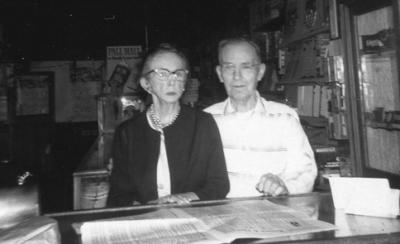
Punchboards have a long tradition in Montana. They’ve been legal, illegal, and nearly legal, and though they are clearly illegal today, one can’t help finding a certain similarity between the boards and today’s state-run, scratch-off tickets — except that the businesses no longer get the largest cut.
A punchboard consisted of a paper cover over a board drilled with holes. As far back as the 18th century, tavern owners on the East coast made their own boards. A rolled-up slip of paper in each hole was then secured with a paper backing. For a price, hopeful customers could punch out one of the holes. Sometimes it revealed a prize. Most often it revealed that the customer had just paid for a worthless slip of paper.
Since the boards were homemade, it may be assumed that the odds were with the tavern owner.
Eventually, the boards were produced commercially, and in 1905, a pair of entrepreneurs in Chicago obtained US Patent No. 780,086 for the punchboard design, which became the standard. By some accounts, mainly in bars. With nearly 3,000 holes on some boards, an honest business could make a tidy profit, even at 10¢ or 25¢ a try, and some boards cost five dollars or more per hole. For a less-honest business, it was pure profit.
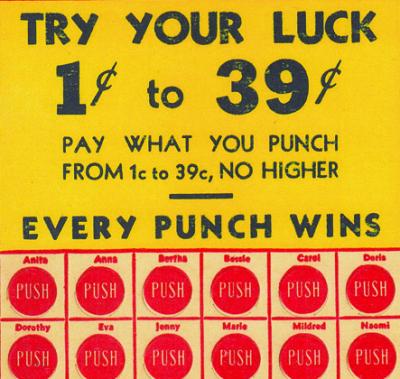
Montana itself may be said to be a gamble. From the gold fields to the wheat fields, there has always been an element of risk-taking that characterizes its citizens. Puncboards, legal and otherwise, found easy acceptance. From their peak in the 1930s to their apparent disappearance in the 1970s, they were ubiquitous. Even today, sit down at any coffee shop counter and ask the old-timers, “Do you remember punchboards?” and you won’t be able to take notes fast enough.
Illegal status didn’t quash the punchboards; the bartenders simply kept them behind the bar. If a careful glance around revealed no strangers, they were brought out for regular customers.
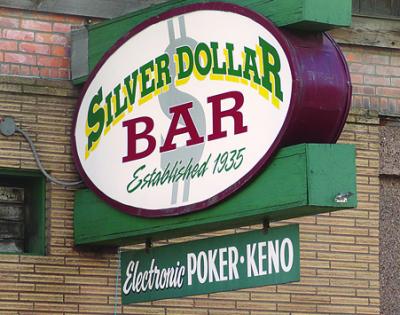
One night a janitor at one establishment spent an entire shift punching out every hole of every board at the bar. He should have been cleaning up instead of trying to clean up.
When most of a board had been bought and the big prize was still unclaimed, the board was typically removed from play. It is a matter of debate whether this was done to prevent a winner or to conceal the fact that there would have been no winner. One disgruntled customer, having dropped quite a bit of money on losing holes, stole the card, punched out all the remaining holes and found there hadn’t been a winning spot on the entire board.
In the end, a few customers won and a lot lost. The businesses generally profited, as long as the punchboard salesman was honest. The fact remains that punchboard or scratch-off, it’s good to think of gambling as an amusement, not a career. The house always wins. And these days, sometimes the senate.
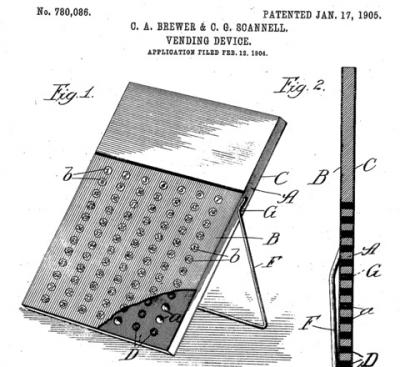
Punchcard Tales Told...
During the Depression, punchboard salesmen would come to towns and sell the boards to bar owners. A young Deer Lodge man, broke, (as who wasn’t in the 30s?) told how one salesman would then give him the position of the winning holes. He would play the cards, win the big pots, give most of the money to the salesman and take a cut for his participation.
The Keys Hotel in Missoula couldn’t survive on the room rate alone. The only thing that kept it going was punchboard gambling. The boards had long been illegal, but law enforcement throughout the state commonly ignored the activity. When the law finally clamped down, the hotel went under. I got this story from the hotel owner’s granddaughter.
The prize wasn’t always monetary. Some boards were played for merchandise, meals, cigarettes or candy. “There were these chocolate-covered cherries,” reminisced one coffee shop informant. “Eeuck! They were awful!”
• The chicanery wasn’t all one-sided. A bartender in Drummond in the early 1970s was warned to keep a sharp eye on two particular patrons. Customers paid for the number of holes they punched out, and one rather buxom customer would drop the non-winning slips down the front of her blouse to hide the “evidence” and avoid paying. The other customer, lacking her impressive décolletage, would eat them.
• A young married man from Philipsburg stopped by the Brown Derby at Georgetown Lake on payday to pick up his dry cleaning. Like everyone in P-burg, he dropped it off there; it was taken to Anaconda and brought back cleaned. He decided to have one beer and give a puncboard a try. Four hundred dollars later — an entire week’s wages — he returned home to his wife and four children with his pockets empty. Apparently both he and his suit had been taken to the cleaners.
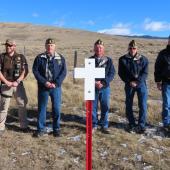

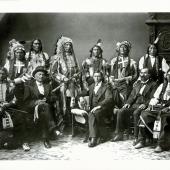

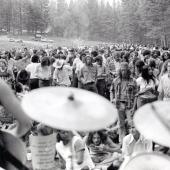




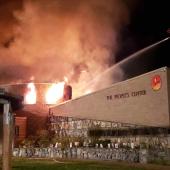

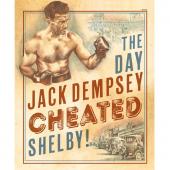
Leave a Comment Here